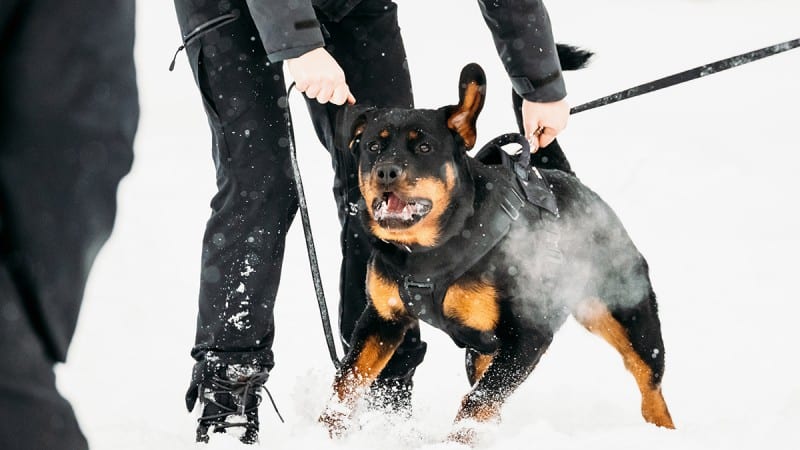If you’ve ever wondered why Rottweilers can be aggressive, you’re in the right place! 🐾 It’s a common question that many people have. But before we dive into it, let’s pause and take a closer look at these magnificent dogs. Rottweilers are known for their strength, loyalty, and protective nature, making them a popular choice for families and security purposes. However, some individuals of this breed may exhibit aggressive behavior. So, why is that the case? Let’s explore this intriguing topic together!
Now, let’s get to the heart of the matter. Aggression in Rottweilers can stem from a combination of factors, including genetics, socialization, and training. Genetics play a role because certain lines of Rottweilers may have a predisposition towards aggression. It’s essential to choose a reputable breeder who focuses on producing well-tempered and stable Rottweilers to minimize the risk. Additionally, the early socialization and training experiences a Rottweiler receives will greatly influence their behavior. Positive reinforcement and gentle guidance are key to shaping a well-behaved and non-aggressive Rottie.
It’s important to note that aggression in Rottweilers is typically a result of mismanagement and external factors rather than an inherent characteristic. Like any dog, they respond to the environment and upbringing they’re exposed to. With proper socialization, training, and responsible ownership, Rottweilers can be loving, gentle, and well-behaved companions. So, don’t let the notion of aggression deter you from considering this breed; they have many wonderful qualities to offer!

Why Are Rottweilers Aggressive? Understanding the Factors Behind Rottweiler Aggression
Rottweilers are known for their powerful build, protective nature, and loyalty. However, they also have a reputation for aggression. It is essential to understand that aggression in Rottweilers is not inherent but can be influenced by various factors. In this article, we will delve into the reasons behind Rottweiler aggression, enabling owners and potential owners to better understand and manage this behavior.
1. Genetics and Breeding
Rottweilers have a history of being bred as working and guard dogs. Traits such as protectiveness and territoriality were selectively bred into the breed. However, improper breeding practices or irresponsible breeders may amplify certain undesirable behaviors, including aggression. It is crucial to choose a reputable and responsible breeder who focuses on temperament and health when considering a Rottweiler.
Some genetic factors can contribute to aggression. One such factor is a lack of socialization during the crucial developmental period. Insufficient exposure to different people, animals, and situations can lead to fear and aggression in Rottweilers. Genetic predisposition combined with inadequate socialization can increase the chances of aggressive behavior in these dogs.
2. Lack of Proper Training and Socialization
Proper training and socialization are vital for any dog breed, including Rottweilers. Without adequate guidance and socialization, Rottweilers can develop aggressive tendencies. Training should begin at an early age and focus on positive reinforcement techniques, building trust, and teaching commands. Exposing the dog to various environments, people, and animals helps them develop into well-rounded and non-aggressive adults.
A lack of training and socialization can lead to behavioral problems such as fear-based aggression, resource guarding, and territorial aggression. Consistent and positive training methods, along with regular socialization, are key to preventing aggressive behavior in Rottweilers.
3. Protective Instincts and Territorial Behavior
Rottweilers have a natural protective instinct, which, if not properly managed, can manifest as aggression. They are known to be fiercely loyal to their families and can become protective of their territory, including their home and yard. While this can be an asset in certain situations, it can also lead to aggression if not properly channeled.
Owners must establish themselves as the pack leader and provide adequate socialization to help Rottweilers differentiate between genuine threats and normal situations. Proper training, supervision, and controlled exposure to different people and situations can help curb territorial aggression in Rottweilers and foster a balanced temperament.
4. Fear and Anxiety
Like any other dog, Rottweilers can develop fear and anxiety, which may result in aggressive behavior. Some dogs may have had traumatic experiences in their past, while others may be genetically predisposed to fearfulness. Situations that trigger fear or anxiety can cause Rottweilers to exhibit aggression as a defensive mechanism.
Owners should be observant and identify triggers that cause fear or anxiety in their Rottweilers. Professional help from an experienced dog trainer or behaviorist can be invaluable in helping dogs overcome these issues. By providing a safe and supportive environment, it is possible to manage and reduce fear-based aggression in Rottweilers.
5. Medical Issues and Pain
Aggression can be a symptom of underlying medical issues or pain in Rottweilers. Dogs are unable to communicate their discomfort verbally, and aggression may be their way of expressing pain or discomfort. It is essential for owners to monitor their Rottweilers’ health and seek veterinary attention if any signs of illness or pain are observed.
Regular veterinary check-ups, along with open communication between owners and veterinarians, can help identify and address any medical issues that may contribute to aggressive behavior. Treating the root cause of aggression by addressing underlying health problems is crucial in managing and resolving aggressive behavior in Rottweilers.
6. Lack of Exercise and Mental Stimulation
Rottweilers are an active and intelligent breed that requires both physical exercise and mental stimulation. A lack of proper exercise and mental stimulation can lead to boredom, frustration, and pent-up energy, which can manifest as aggression.
Regular exercise, such as daily walks, runs, or engaging in dog sports, can help channel the Rottweiler’s energy in a positive way. Mental stimulation, such as puzzle toys, obedience training, and interactive play sessions, can also prevent boredom and alleviate aggressive tendencies.
7. Owner Influence and Environment
Lastly, the behavior and environment provided by owners play a significant role in shaping a Rottweiler’s temperament and behavior. Dogs are highly influenced by their surroundings and the behavior of their owners. Inconsistent rules, lack of structure, dominance-based training methods, and exposure to violence or abusive environments can contribute to aggressive behavior in Rottweilers.
Owners should focus on positive reinforcement training methods, provide a stable and loving environment, and address any behavioral issues promptly. A loving and supportive relationship based on mutual respect and trust is crucial for preventing and managing aggression in Rottweilers.
The Importance of Professional Training and Behavioral Support
1. Basic Obedience Training
Proper obedience training is essential for every Rottweiler to ensure they understand and respond to commands. Basic training includes commands such as sit, stay, come, and leave it. Training should be conducted using positive reinforcement techniques, such as treats and praise, to motivate and reward the dog.
2. Socialization
Socialization is a critical aspect of raising a well-behaved and non-aggressive Rottweiler. It involves exposing the dog to various environments, people, animals, and situations in a controlled and positive way. Regular socialization ensures that the dog is comfortable and confident in different social settings.
3. Behavioral Modification
For Rottweilers displaying aggressive behavior, professional help from a certified dog trainer or behaviorist is highly recommended. These professionals have the knowledge and experience to assess the root cause of aggression, develop a customized behavior modification plan, and guide owners in implementing the necessary training techniques.
By addressing the underlying causes and providing professional support, owners can help their Rottweilers overcome aggression and foster a balanced and well-behaved temperament.
In conclusion, understanding the reasons behind Rottweiler aggression is vital for responsible ownership. Factors such as genetics, lack of training and socialization, protective instincts, fear and anxiety, medical issues, lack of exercise, and owner influence all contribute to aggressive behavior in Rottweilers. By addressing these factors and seeking professional training and support when needed, owners can ensure the well-being and social adaptation of their Rottweilers. Responsible ownership, along with proper training and socialization, can help Rottweilers become loving and non-aggressive companions.
Key Takeaways – Why Are Rottweilers Aggressive?
- Rottweilers can be aggressive due to a lack of socialization and training.
- Poor breeding practices and genetic factors can contribute to aggressive behavior in Rottweilers.
- Protective instincts can make Rottweilers prone to aggression towards strangers or other dogs.
- Health issues or pain can cause aggression in Rottweilers, so regular vet checkups are important.
- Early experiences and interactions with humans and other animals play a significant role in a Rottweiler’s behavior.
Frequently Asked Questions
Do Rottweilers have a reputation for being aggressive? What are some factors that contribute to aggression in Rottweilers?
1. Are Rottweilers really aggressive dogs?
Rottweilers have gained a reputation for aggression due to various factors. However, it is important to note that not all Rottweilers are aggressive. Like any other breed, their behavior is influenced by factors such as genetics, socialization, training, and environment. While they can be protective and assertive, with proper care and training, Rottweilers can be friendly and well-behaved companions.
It is essential to understand that aggression in Rottweilers is not an inherent or inevitable trait of the breed. Responsible ownership, proper training, and socialization play a significant role in shaping their behavior and temperament.
2. What factors contribute to aggression in Rottweilers?
Several factors can contribute to aggression in Rottweilers. The primary factor is poor socialization. If not exposed to different people, animals, and environments during their early development stages, Rottweilers may become fearful and aggressive towards unfamiliar situations or individuals. Lack of training and discipline can also result in undesirable behaviors.
Additionally, genetic predisposition can influence aggression in any dog breed, including Rottweilers. It is crucial to obtain a Rottweiler from a responsible breeder who focuses on breeding for good temperament and health. Lastly, abuse or neglect by previous owners can also contribute to aggression in Rottweilers.
3. Can aggressive behavior in Rottweilers be modified or corrected?
Yes, aggressive behavior in Rottweilers can often be modified or corrected with proper training and behavior modification techniques. It is essential to work with a professional dog trainer or behaviorist who has experience in dealing with aggression. They can assess the underlying causes and develop a customized plan to address the specific aggression issues in your Rottweiler.
Consistent positive reinforcement, socialization, and obedience training are crucial to help Rottweilers become well-behaved and balanced dogs. It is important to note that modifying aggressive behavior requires patience, time, and a commitment to providing a structured and nurturing environment.
4. How can proper socialization help prevent aggression in Rottweilers?
Proper socialization is crucial in preventing aggression in Rottweilers. Exposing them to various people, animals, and environments from a young age helps them become well-adjusted and less fearful. Socialization helps them learn appropriate behaviors and reduces the likelihood of reacting aggressively in new or unfamiliar situations.
Gradual, positive exposure to different sights, sounds, and experiences can help Rottweilers build confidence and develop a friendly demeanor. Regular interactions with other dogs, supervised playdates, and controlled encounters with strangers can also contribute to their social development and prevent aggressive tendencies from developing.
5. How important is training in preventing aggression in Rottweilers?
Training plays a crucial role in preventing aggression in Rottweilers. A well-trained Rottweiler understands boundaries, knows how to communicate effectively, and has self-control. Basic obedience training, such as teaching commands like “sit,” “stay,” and “leave it,” helps establish a foundation of discipline and establishes you as the leader.
Consistent, positive reinforcement training methods, using rewards and praise, can help shape desired behaviors and discourage aggressive tendencies. Training should be ongoing and reinforced throughout their life to ensure that Rottweilers continue to behave appropriately and respond to commands, promoting a harmonious relationship between the dog and its owner.

Summary
Rottweilers can sometimes be aggressive due to various factors. It’s important to remember that not all Rottweilers are aggressive, but some may display aggressive behavior due to poor socialization, fear, or protective instincts. Early training, positive reinforcement, and proper socialization can help prevent aggression in Rottweilers.
Properly understanding and addressing aggression in Rottweilers is crucial. It’s not solely about their breed, but rather the individual dog’s upbringing and experiences. With the right care and training, Rottweilers can be loving and loyal companions.
